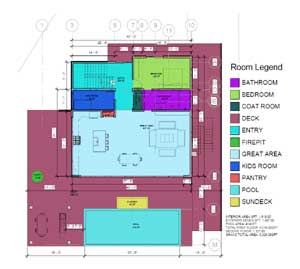Juan Manuel Gálvez International Airport (Spanish: Aeropuerto Internacional Juan Manuel Gálvez) (IATA: RTB, ICAO: MHRO) is an international airport located on the island of Roatán, in the Caribbean Sea 50 kilometres (31 mi) off the northern coast of Honduras.[4] Roatán is in the Bay Islands Department of Honduras.
The airport serves national and international air traffic of the island, the nearby cities and for the region. The airport is named for Juan Manuel Gálvez (1889-1972), the former president of the Republic of Honduras in 1949–1952. It was known previously as Roatán International Airport.
Location
The airport is located in the western part of Roatán, near the main city of Coxen Hole.
Renovation
In 2013, InterAirports completed an expansion and upgrade of the airport facilities. The expansion included a larger check-in area with coffee shop and cafe, larger waiting area with sitting area and cafe, expansion of the customs and security areas, and renovation of buildings and outdoor areas.
The next phase of the project will be an expansion of the airport's car parks and pick-up and drop-off locations, rental area, and shopping area. In January 2022, the runway extension work will begin, so the airport can pass 3 million passengers per year and accept intercontinental flights.
Runway
The airport is at an elevation of 20 feet (6 m) above mean sea level. It has one runway designated 07/25 with an asphalt surface measuring 2,090 by 45 metres (6,857 ft × 148 ft).[1]
Passport must have six months validity.
One page required for entry stamp.
No for stays of up to 90 days.
Required: Honduras currently requires travelers arriving from or traveling to Panama and every nation in South America to present proof of yellow fever vaccine. Effective March 22, 2023: Travelers are no longer required to provide proof of vaccination against COVID-19 or negative test results for a PCR, Antingen, or ELISA test prior to entry in to Honduras. Airlines may still require additional documentation prior to boarding. Suggested: measles, rubella, rabies, hepatitis A, hepatitis B, typhoid.
Travelers must declare any amount over $10,000.
Travelers must declare any amount over $10,000.
U.S. Embassy Tegucigalpa
Avenida La Paz
Tegucigalpa M.D.C.
Honduras
Telephone: +(504) 2236-9320 or +(504) 2238-5114
Emergency After-Hours Telephone: +(504) 2238-5114 or +(504) 2236-9320
Fax: +(504) 2238-4357
Business Hours: Monday - Thursday, 7:30 a.m. to 4:00p.m. Friday, 7:30a.m. to 3:00 p.m
Consulates
U.S. Consular Agent - San Pedro Sula
Banco Atlántida Building
11th Floor, across the street from Central Park
San Pedro Sula
Honduras
Telephone: +(504) 2558-1580
Emergency After-Hours Telephone: Please contact the U.S. Embassy in Tegucigalpa: +(504) 2238-5114 or +(504) 2236-9320, extension 4100
Business Hours: Mondays and Tuesdays 7:00 a.m. to 1:30 p.m.; Wednesdays and Thursdays 7:00 a.m. to 1:00 p.m. Closed Fridays.
To enter Honduras, you need:
- A U.S. passport with at least six months validity.
- Evidence of onward travel. For stays of up to 90 days, you do not need a visa for tourism.
- Please note, individuals who do not obtain the appropriate visa, or overstay their time in Honduras, may face significant exit fines.
Visit the Embassy of Honduras website or any of the Honduran consulate websites for the most current visa information.
Special Requirements for Minors: Under Honduran law, children under age 21 who are traveling unaccompanied or with only one parent must have written, notarized permission to travel from the non-traveling parent(s).
- If notarizing a permission letter in Honduras, the letter should be notarized by a Honduran notary public.
- If notarizing a permission letter in the United States, the letter should be apostilled by the U.S. state registrar where the notary is registered. Honduran immigration authorities may also accept permission letters notarized at a Honduran embassy or consulate in the United States.
- If there is no second parent with legal custody of the child (e.g., the second parent is deceased, one parent has sole custody, etc.), travelers can provide copies of the relevant paperwork such as a court decision, birth certificate naming only one parent, death certificate, etc.
The U.S. Department of State is unaware of any HIV/AIDS entry restrictions for visitors or residents of Honduras.
Road Conditions and Safety: Because of crime, poor road conditions, and heavy commercial truck traffic, driving in Honduras can be dangerous. The U.S. Embassy discourages car and bus travel after dark.
- Honduran roads are poorly lit and poorly marked.
- Traffic signs are often inadequate or non-existent.
- Drivers don’t always use headlights at night.
- People and animals wander onto the roads.
- Rockslides are common, especially in the rainy season (May through December) and can cause closure of major highways.
Dangerous stretches of road include:
- The road between Tegucigalpa to Choluteca: Be aware of mountain curves.
- The road from El Progreso to La Ceiba: Bridges may be in poor condition due to regular flooding.
- CA-5 and the highway between San Pedro Sula and Tela, particularly near the palm tree plantations near El Progreso: Carjackings and robberies that target SUVs and usually occur at night.
- The road from Juticalpa to Telica, and from the turn off to Gualaco on Route 39 to San Esteban and Bonito Oriental: Rival criminal elements engage in violent acts against one another. Avoid this road and stay on the main Tegucigalpa-Juticalpa-Catacamas road while traveling in Olancho.
While Honduras and the United States have signed and ratified a Stolen Vehicle Treaty, existing Honduran laws protect good faith buyers (even of stolen vehicles), so the recovery and return of these vehicles to their original owners is not guaranteed. Vehicle insurance may mitigate loss; please check with the National Insurance Crime Bureau or with private insurance carriers about coverage details.
Traffic Laws: In an accident, contact the Honduran Transit Authority (“Transito”) by dialing 911.
- Honduran law requires all vehicles involved in an accident to remain in place until Transit Authority agents arrive.
- Notify your car insurance company as soon as possible, preferably right after the accident.
- Carry personal identification documents, including your driver’s license, copies of passports, and vehicle registration cards while driving.
Public Transportation: Avoid public transportation in Honduras.
- If you must travel by bus, always travel during daylight hours and on first-class conveyances, not economy buses.
- Choose taxis or rideshares carefully. Use Radio-Taxi services (companies that operate by phone) or app-based rideshare programs rather than hailing a taxi on the street and note the driver’s name and license number. Hotels and resorts may be able to recommend trusted taxi or shuttle services. Instruct the driver not to pick up other passengers, agree on the fare before you enter the vehicle, and have small bills available for payment, as taxi drivers often do not make change.
- When possible, travel in groups.
See our Road Safety page for more information.
Aviation Safety Oversight:As there is no direct commercial air service to the United States by carriers registered in Honduras, the U.S. Federal Aviation Administration (FAA) has not assessed the government of Honduras’s Civil Aviation Authority for compliance with International Civil Aviation Organization (ICAO) aviation safety standards. Further information may be found on the FAA’s safety assessment page.
Maritime Travel: Mariners planning travel to Guatemala should also check for U.S. maritime advisories and alerts. Information may also be posted to the U.S. Coast Guard homeport website, and the NGA broadcast warnings.
Immigration Precheck Form
The Immigration Precheck form is no longer required unless you are a Nicaraguan citizen.
February 14, 2024 Press Release:
INM 001-24 PRESS RELEASE
The National Institute of Migration (INM) informs the national and international community that on the instruction of President Xlomara Castro:
1. As of December 12, 2023, pre-screening for national and foreign users is no longer a mandatory requirement to leave or enter Honduras.
2. The main purpose of this provision is to speed up the process of obtaining a transfer at the various border points of the country and to facilitate the procedure for the transfer of users via air, land, or sea.
3. The immigration pre-check will only be a mandatory requirement for Nicaraguan citizens, who must carry it out seven (7) days before the scheduled date of departure to Honduras, by entering the platform: prechequeo.inm.gob.hn
4. The INM will maintain the necessary controls, security verifications, and protocols to guarantee the protection of the users entering and leaving the country.
See the official announcement in Spanish here.
Translation of Website
BOOK NOW
Virtual Tours

Hotel Features

Free WiFi and Free Parking
Outdoor Kitchen
Year Round Pool on Ocean
Rooftop Spa



















